|
|
|
Sort Order |
|
|
|
Items / Page
|
|
|
|
|
|
|
| Srl | Item |
| 1 |
ID:
147299


|
|
|
|
|
| Summary/Abstract |
Grounded in an analysis of the unique advantages of China-Russia relations, the paper argues that the two countries have established a high level of political trust and will continue to work in concert on all fronts. It also looks back at how China entered into alliances throughout its history and the lessons it has learned from those experiences. It emphasizes that China does not deem the establishment of exclusive alliances or political blocs as a foreign policy option.
|
|
|
|
|
|
|
|
|
|
|
|
|
|
|
|
| 2 |
ID:
124766
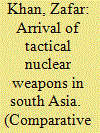

|
|
|
|
|
| Publication |
2013.
|
| Summary/Abstract |
This article examines the arrival of Tactical Nuclear Weapons (TNWs) amid the rapid arms race in South Asia. It analyzes the stability and instability prospects linked to the arrival of and dependence on TNWs. It states that TNW is a murky term that confronts a definitional issue. Although TNW has not been used yet, it entails the risk of its use on the battlefield in the event of a limited war. Conceptually, this sets the stage for an interesting debate on whether or not the arrival of TNWs is stabilizing for the South Asian region, which has confronted many wars and minor border skirmishes during pre- and post-nuclear periods. Since it is viewed that a possible limited military escalation to a nuclear level may not be ruled out and the arrival of TNWs has become a reality, the article concludes that a centralized command and control system bolstered with the non-deployed deterring posture of TNWs is the immediate solution to avert the related worries of pre-delegation, force protection, and the use-or-lose dilemma. It is expected that, learning from their nuclear predecessors, the South Asian nuclear leadership would practice restraint, remain rational, and call for the need of political trust and military reassurances to avert nuclear weapon use.
|
|
|
|
|
|
|
|
|
|
|
|
|
|
|
|
| 3 |
ID:
174822


|
|
|
|
|
| Summary/Abstract |
Existing studies of the impact of economic development on political trust in China have two major gaps: they fail to explain how economic development contributes to the hierarchical trust pattern, and they do not pay enough attention to the underlying mechanisms. In light of cultural theory and political control theory, we propose adapting performance theory into a theory of “asymmetrical attribution of performance” to better illuminate the case of China. This adapted theory leads to dual pathway theses: expectation fulfillment and local blaming. Using a multilevel mediation model, we show that expectation fulfillment mainly upholds trust in the central government, whereas local blaming undermines trust in local governments. We also uncover a rural–urban distinction in the dual pathway, revealing that both theses are more salient among rural Chinese.
|
|
|
|
|
|
|
|
|
|
|
|
|
|
|
|
| 4 |
ID:
109193
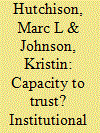

|
|
|
|
|
| Publication |
2011.
|
| Summary/Abstract |
Civil conflict and state failure has often been linked to breakdowns in regime legitimacy. Trust in government is a critical element of regime legitimacy and the state's ability to mediate between the demands of competing groups within society. We contend that government capability is a primary factor in shaping individuals' ascription of legitimacy to the state. Capable governments foster perceptions of legitimacy while poor institutional performance decreases the degree to which individuals trust their government. While some tests of this relationship exist in extant literature, much of the work fails to integrate both micro- and macro-level factors, is confined to regions with established state performance, or is based on single-country studies. Our approach avoids many of these deficiencies by using 32 Afrobarometer surveys collected across 16 different countries from 2000 to 2005 and employing hierarchical linear models to estimate the effects of temporal-specific, state-level variables on levels of individual trust. We find that higher institutional capacity is associated with increased levels of individual trust in government across African countries. Furthermore, we demonstrate that this effect on political trust is independent of other individual-level attitudes, socio-economic characteristics, and a state's prior internal conflicts.
|
|
|
|
|
|
|
|
|
|
|
|
|
|
|
|
| 5 |
ID:
181843
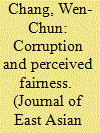

|
|
|
|
|
| Summary/Abstract |
Corruption can erode political trust and a well-functioning democratic system, but it is unclear whether perceptions of corruption are significantly associated with citizens’ perceptions about the fairness of income distribution. This study thus examines the role of political trust in shaping the relationship between perceptions of corruption and perceived fairness of income distribution for East Asian countries. The findings show that perceived corruption has strong detrimental effects on political trust, and that those who have lower levels of political trust are more likely to perceive the income distribution as unfair in their countries. Causal mediation analysis results indicate that political trust plays an important role in mediating the negative effect of perceived corruption on perceived fairness of income distribution. Moreover, the results from examining the mutual causality linking corruption, political trust, and perceived fairness suggest that the reciprocal causal effects are also significant and robust.
|
|
|
|
|
|
|
|
|
|
|
|
|
|
|
|
| 6 |
ID:
161353
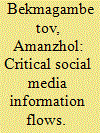

|
|
|
|
|
| Summary/Abstract |
In political regimes where traditional mass media are under state control, social networking sites may be the only place where citizens are exposed to and exchange dissident information. Despite all the attempts, complete control of social media seems to be implausible. We argue that the critical information that people see, read and share online undermines their trust in political institutions. This diminishing trust may threaten the legitimacy of the ruling regime and stimulate protest behaviour. We rely on original survey data of Kazakhstani college students to confirm these expectations. The data are unique in that they directly measure exposure to critical/dissident information, as opposed to simply assuming it. The analysis leverages Coarsened Exact Matching to simulate experimental conditions. This allows us to better identify the consequential mechanism and the attitudinal precursor by which social media influence protest in an authoritarian context.
|
|
|
|
|
|
|
|
|
|
|
|
|
|
|
|
| 7 |
ID:
111843


|
|
|
|
|
| Publication |
2012.
|
| Summary/Abstract |
One of the defining features of modern states is their incorporation of notions of political and social community based on shared language, history, and myths. However, large numbers of citizens in modern states have come to believe their national communities are under threat from several modern forces, including immigration. Using the European Social Survey (2002-9), this article explores the extent to which perceived threats posed by large-scale immigration undermine national political communities by reducing trust in national politicians and political institutions. The findings indicate that even after controlling for other predictors of trust in the political system, concerns about the effect of immigration on the national community have an impact on trust in politics. Moreover, having a lengthy postwar history with mass immigration mediates this effect, while the potentially mobilizing effects of far-right parties on the relationship between concern about immigration and political distrust are somewhat limited.
|
|
|
|
|
|
|
|
|
|
|
|
|
|
|
|
| 8 |
ID:
184715


|
|
|
|
|
| Summary/Abstract |
Survey results inflate political trust in China if the observed trust in the central government is mistaken for the latent trust in the Centre. The target of trust in the country is the Centre, which is ultimately the top leader. The critical issue domain for assessing the Centre's trustworthiness is policy implementation rather than policymaking. The Centre's trustworthiness has two dimensions: commitment to good governance and the capacity to discipline local officials. Observed trust in the central government indicates trust in the Centre's commitment, while observed trust in the local government reflects confidence in the Centre's capacity. A machine learning analysis of a national survey reveals how much conventional reading overestimates political trust. At first glance, 85 per cent of the respondents trust the central government. Upon further inspection, 18 per cent have total trust in the Centre, 34 per cent have partial trust and 33 per cent are sceptical.
|
|
|
|
|
|
|
|
|
|
|
|
|
|
|
|
| 9 |
ID:
193221
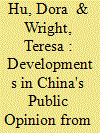

|
|
|
|
|
| Summary/Abstract |
This original analysis of the World Values Survey waves of 2007, 2012 and 2018 reveals important relationships among political trust and satisfaction, happiness, views of corruption, local elections and activism from the last half of the Hu Jintao administration through the first five years of Xi Jinping's rule. These data shed new light on the deeper dynamics underlying the high and growing levels of trust in government documented in other studies. Among this report's more novel findings, we find increased trust in government coincides with decreased local electoral participation, suggesting that participation in local elections is not key to perceptions of regime legitimacy. Views of corruption and a sense of personal efficacy through non-institutionalized forms of political participation such as peaceful demonstrations appear more relevant. Thus, constraints on people's ability to engage in peaceful demonstrations are likely to negatively impact views of regime legitimacy. In addition, the report uncovers demographic variations in these dynamics, indicating that regime legitimacy is more precarious among citizens at the bottom of the socioeconomic hierarchy and among younger Chinese. Overall, these findings complicate existing explanations of regime legitimacy centring on economic performance, nationalism, responsiveness/adaptiveness and efforts to combat corruption.
|
|
|
|
|
|
|
|
|
|
|
|
|
|
|
|
| 10 |
ID:
102576


|
|
|
|
|
| Publication |
2011.
|
| Summary/Abstract |
Scholars have repeatedly expressed concern about the consequences low levels of political trust might have for the stability of democratic political systems. Empirical support and the identification of causal mechanisms for this concern, however, are often lacking. In this article, the relation between political trust and law-abiding attitudes is investigated. It is expected that citizens with low levels of trust in the institutions of the political system will find it more acceptable to break the law. As a result, low levels of political trust might undermine the effectiveness and legitimacy of government action and its ability to implement legislation. Based on survey data from 33 European countries using the 1999-2001 European Values Study (N = 41,125), the relation between political trust and legal permissiveness is examined using a multilevel ordered logistic regression analysis. The results show that respondents with low levels of political trust are significantly more likely to accept illegal behaviour such as tax fraud than respondents with high levels of political trust. Since it is known from earlier research that actors who are permissive towards law-breaking behaviour are more likely to commit these acts themselves, the hypothesis that low levels of political trust will be associated with less law compliance within a society is supported.
|
|
|
|
|
|
|
|
|
|
|
|
|
|
|
|
| 11 |
ID:
158098


|
|
|
|
|
| Summary/Abstract |
Existing research on the relationship between political trust and political participation has generated mixed results. In pursuit of a better explanation of this relationship, we argue that trust in institutions has varying effects on participation for minority and majority groups. In this paper, we analyze Turkish and minority attitudes toward Turkish institutions. We find strong support that trust in institutions affects majority and minority political participation differently. These results highlight the divergent processes at work in the relationships between political trust and political participation across majority and minority citizens in Turkey due to their varied experiences with these institutions. Some of our most interesting findings show that minorities, unlike citizens from the majority group who have higher trust in police, are more likely to protest, and minorities with trust in political parties are actually less likely to join these parties. We explain these surprising findings within the context of Turkey’s post-armed conflict political context.
|
|
|
|
|
|
|
|
|
|
|
|
|
|
|
|
| 12 |
ID:
174674


|
|
|
|
|
| Summary/Abstract |
It is commonly said that the lockdowns and social distancing necessary to control coronavirus pandemics will only work if the general population trusts its government, believes the information it provides, and has confidence in its policies. This article traces the British government’s record in providing information about its policies and performance, and compares this with the public’s use of the mainstream news media. It then considers how these two sources of information affected trust in government and public compliance with social distancing and lockdown rules. Lastly, it compares Covid‐19 with Brexit and draws conclusions about how beliefs and behaviour are formed when individuals are personally faced with a serious threat.
|
|
|
|
|
|
|
|
|
|
|
|
|
|
|
|
| 13 |
ID:
173260


|
|
|
|
|
| Summary/Abstract |
Much scholarly attention has been devoted to the subject of whether and how social connections affect political trust. China provides a critical case because of the unique guanxi networks and the symbiosis between the state and non-governmental associations. In the Chinese context, this analysis proposes that: 1) informal social ties impair political trust since guanxi networking offers provisional publics the transmission of political stimuli, 2) formal social ties foster political trust because associations and the state coexist in a state-dominant symbiotic sphere that brings about political trust assimilations by helping associations realize their agendas and interests. Based on survey data from urban China, findings from both standard models and auxiliary instrumental variable analyses generally support these predictions.
|
|
|
|
|
|
|
|
|
|
|
|
|
|
|
|
| 14 |
ID:
148478


|
|
|
|
|
| Summary/Abstract |
As a fundamental concept in peace research, trust, or the lack of it, has shown to be associated with the onset of violent conflict, the instability of negotiated settlement, and the sustainability of peace. Despite its proven importance, the question of how political trust can be built after civil conflicts has only received limited attention and remains unanswered. While previous studies demonstrated that improved provision of public services plays a significant role in a trust-building process, the present article shows a more nuanced picture, namely that service enhancement only works if it reflects the needs of people. Projects that do not properly mirror the needs of people, however, have no direct effect on building political trust. Using micro-level data from Sierra Leone, the article finds that people are more likely to trust governments that are willing to listen and respond to their needs and demands. Though government performance carries the previously hypothesized effect, its explanatory power reduces substantively once responsiveness is introduced into the analysis. This finding also holds when potential biases due to endogeneity and sample selection are considered. Results from a mediation analysis also indicate that if government performance has any effect, it is transmitted through the responsiveness mechanism. Overall, this article contributes to the literature by clarifying the mechanism of trust-building in post-conflict societies.
|
|
|
|
|
|
|
|
|
|
|
|
|
|
|
|
| 15 |
ID:
152451
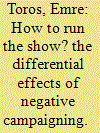

|
|
|
|
|
| Summary/Abstract |
Although the academic literature on negative campaigning is growing, more research is needed to contribute to the theoretical and empirical knowledge on the phenomenon. Accordingly, this article examines the impact of negative political messages on political trust in Turkey. The findings indicate that although exposure to negativity alters the trust level of the citizens, this impact is not uniform and dependent on party identifications.
|
|
|
|
|
|
|
|
|
|
|
|
|
|
|
|
| 16 |
ID:
152452
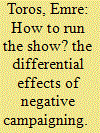

|
|
|
|
|
| Summary/Abstract |
Although the academic literature on negative campaigning is growing, more research is needed to contribute to the theoretical and empirical knowledge on the phenomenon. Accordingly, this article examines the impact of negative political messages on political trust in Turkey. The findings indicate that although exposure to negativity alters the trust level of the citizens, this impact is not uniform and dependent on party identifications.
|
|
|
|
|
|
|
|
|
|
|
|
|
|
|
|
| 17 |
ID:
149754
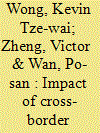

|
|
|
|
|
| Summary/Abstract |
Using official statistics and a pooled dataset of longitudinal surveys, the aim of this article is to examine the impact of the Individual Visit Scheme (IVS) on political trust in Hong Kong. Our multilevel analysis found that the gradual inflow of IVS visitors (mostly overnight visitors) increased political trust in the first few years, but that this trust rapidly diminished in later years, especially after the introduction of the one-year multiple-entry IVS endorsement (which attracted mostly same-day visitors). The main reason for the reduction in the positive impact of the IVS scheme is that the growth in the number of same-day visitors has contributed less to Hong Kong's economy than has the increase in the number of overnight visitors, and has exacerbated several social problems. The impact of mainland visitors has varied across groups with different levels of education. The political trust of people with a senior secondary education has been enhanced more by the increase in overnight visitors and reduced less by the increase in same-day visitors than that of people with a tertiary level of education or a junior secondary education or below.
|
|
|
|
|
|
|
|
|
|
|
|
|
|
|
|
| 18 |
ID:
120147
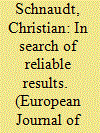

|
|
|
|
|
| Publication |
2013.
|
| Summary/Abstract |
In a recently published article in this journal, Ross Campbell argues that adherence to socialist values establishes a hitherto neglected factor when it comes to the explanation of differences in East and West German citizens' political trust. As the results of his study indicate, adherence to socialist values impacts negatively on citizens' political trust, this effect is more pronounced and more stable over time for East German as compared to West German citizens and is sufficiently strong to eliminate aggregate-level differences in political trust between East and West Germany. However, this research note suggests that Campbell's article contains several substantial inconsistencies and obscurities that question the reliability and validity of the empirical findings presented. It provides a re-analysis of Campbell's main arguments and shows to what extent his initial conclusions can be upheld after the shortcomings have been remedied. The results of this re-analysis suggest that socialist values indeed exhibit a negative impact on German citizens' political trust, which is relatively stronger for East as compared to West German citizens. However, contrary to Campbell's initial results, the negative effect of socialist values on political trust is robust over time for both East and West German citizens. What is more, there is no empirical evidence confirming that differences in adherence to socialist values between East and West German citizens are sufficiently strong to account for aggregate-level differences in political trust. In light of these findings, two of Campbell's three main conclusions are dubious and call for further examination.
|
|
|
|
|
|
|
|
|
|
|
|
|
|
|
|
| 19 |
ID:
183853
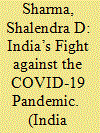

|
|
|
|
|
| Summary/Abstract |
In early 2020, when the COVID-19 pandemic was indiscriminately spreading around the world, the seeming ability of India, the world’s second most populous country (with over 1.3 billion people), to contain the virus within its borders and keep COVID-19 infection and mortality rates low relative to population size was seen as miraculous. However, the miracle ended when the ‘second-wave’ hit India in April 2021. On 1 May 2021, India became the first country in the world to record more than 400,000 coronavirus infections in a single day. This exponential rise in COVID-19 cases started on 28 April 2021 when India recorded 379,459 new COVID-19 cases and 3,647 deaths. This marked the eighth straight day of more than 300,000 cases a day—making India the second-highest COVID-19 case count in the world (over 20 million) with over 25 per cent of the global deaths from COVID. The following examines India’s fight against the pandemic, the failure to contain the second wave, the lessons learned and the way forward.
|
|
|
|
|
|
|
|
|
|
|
|
|
|
|
|
| 20 |
ID:
167069
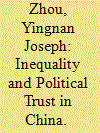

|
|
|
|
|
| Summary/Abstract |
The social volcano thesis states that the rising inequality in China threatens regime stability. This idea, although widely held in the media and in academia, is backed by little positive evidence but by much negative evidence. Two primary pieces of negative evidence are that the Chinese people trust the central government and that they are highly tolerant of inequality. This paper discusses the shortcomings of the negative evidence and re-examines the thesis in a rigorous and direct way. Our multilevel analysis shows that provincial inequality has negative effects on individuals’ trust in the local government but not in the central government, and this negative effect holds for both the rich and the poor. Because distrust in the local government implies distrust in the central government, we conclude that a social volcano exists.
|
|
|
|
|
|
|
|
|
|
|
|
|
|
|
|
|
|
|
|
|